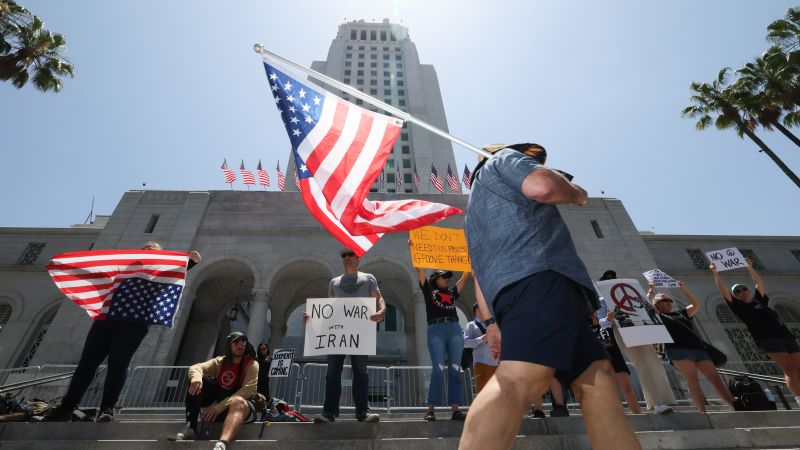Roozbeh Farahanipour saw his name published in an Iranian newspaper — along with a reward for his body, and he knew he was no longer safe, he said.
Elham Yaghoubian, a student activist in Iran who co-founded an underground party against the Islamic Republic with Farahanipour had that same feeling when her friends and fellow activists were arrested in 1999.
Both fled Iran nearly 30 years ago, fearful for their safety. Both built new lives in Los Angeles, where nearly 141,000 Iranian Americans, according to theUS Census, have forged a tight-knit community.
But the two activists, who have had such similar paths to the United States, are split on the country’s strikes in Iran.
Farahanipour, a restaurant owner, had been jailed and tortured for his work as an opposition leader by the time he fled Iran in 2000. He opposes war in the region because he doesn’t want to see another “Afghanistan or Iraq.”
Yaghoubian, who works at a language and translation company, supports the attacks, saying they are “beneficial” for Iran, the Middle East and the world.
The US attack Saturday night led to Iran retaliating with a targeted missile attack on the US Al Udeid Air Base in Qatar.
The strikes, which are part of an escalating conflict between Iran and Israel, have divided Los Angeles’ tight-knit Iranian American community, Farahanipour said.
One of Farahanipour’s restaurants is located on a strip of Westwood Boulevard near UCLA known asPersian Square.
Home to many Iranian businesses, the restaurants, bakeries and bookstores are adorned with signs in both English and Farsi.
On Sunday, nearly three decades after he saw his name on an execution list and a day after the US strikes on Tehran, Farahanipour stood outside the restaurant with his young son.
The pair wore jeans and matching blue polos as they waved the flag of the Iranian diaspora.
Immigration from Iran to the US began in the early 20th century and spiked around the time of the 1979 Islamic Revolution. Over 50 percent of immigrants — including Farahanipour and Yaghoubian — arrived in the US after 1994, according to the UCLA Center for Near Eastern Studies
Many Persian residents refer to the Los Angeles area as “Tehrangeles,” — a mix of Tehran and Los Angeles — according to Bruin Life, a UCLA student website.
On Sunday, demonstraters gathered at the federal building in Westwood to rally against the United State’s involvement in the conflict.
People held signs reading “No War on Iran,” and “We won’t let you drag us into global war.” Others chanted “hands off Iran,” and “Money for jobs and education. Not for wars and occupation.”
The recent strikes, Yaghoubian argued, targeted infrastructure belonging to the Islamic Republic. The US attack hit three nuclear sites in Iran: Fordow, Natanz, and Isfahan.
“These infrastructures, roads, factories, buildings, they can rise again, but what we can never recover are the lives of all young men and women we’ve lost to the brutal regime every time they rise for their basic rights,” Yaghoubian said.
War isn’t something people wanted, but Yaghoubian believes something good could come out of it — the end of the Iranian regime. The attacks represent hope for a better future, she said.
“No negotiation, no appeasement will bring an end this war. Only with removing this regime from Iran will bring peace and prosperity, she said.”
But Farahanipour doesn’t think the attacks will free Iran. He has advocated for a secular Iran, and the “internal toppling” of the Islamic Republic by Iranians. The activist believes the US should not have thrust itself into the conflict.
“Killing the people, regardless in Iran, in Israel, American people, anyone, any civilian or people, they just died, is not an answer,” he said.
